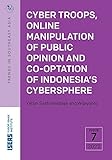Cyber Troops, Online Manipulation of Public Opinion and Co-optation of Indonesia’s Cybersphere / Yatun Sastramidjaja, Wijayanto.
Material type: TextPublisher: Singapore : ISEAS Publishing, [2022]Copyright date: ©2022Description: 1 online resource (27 p.)Content type:
TextPublisher: Singapore : ISEAS Publishing, [2022]Copyright date: ©2022Description: 1 online resource (27 p.)Content type: - 9789815011494
- 9789815011500
- 950 23/eng/20220725eng
- DS501
- online - DeGruyter
| Item type | Current library | Call number | URL | Status | Notes | Barcode | |
|---|---|---|---|---|---|---|---|
 eBook
eBook
|
Biblioteca "Angelicum" Pont. Univ. S.Tommaso d'Aquino Nuvola online | online - DeGruyter (Browse shelf(Opens below)) | Online access | Not for loan (Accesso limitato) | Accesso per gli utenti autorizzati / Access for authorized users | (dgr)9789815011500 |
Frontmatter -- FOREWORD -- Cyber Troops, Online Manipulation of Public Opinion and Co-optation of Indonesia’s Cybersphere. EXECUTIVE SUMMARY -- Cyber Troops, Online Manipulation of Public Opinion and Co-optation of Indonesia’s Cybersphere -- THE CO-OPTATION OF CYBERSPACE AS AUTHORITARIAN INNOVATION
restricted access online access with authorization star
http://purl.org/coar/access_right/c_16ec
Organized propaganda and public opinion manipulation are increasing in Indonesia’s cybersphere. Specifically, since 2019, there has been a marked rise of cyber troop campaigns that serve to mobilize public consensus for controversial government policies. Cyber troop operations played a crucial role in three controversial events in which public opinion had been initially critical of the government policy at issue. These were, first, the revision of the Law on the Corruption Eradication Commission in September 2019; second, the launch of the New Normal policy during the COVID-19 pandemic in May 2020; and third, the passing of the Omnibus Law for Job Creation in October 2020. In all three cases, there is clear evidence of cyber troops manipulating public opinion in support of government policy. In all three cases, the cyber troops manufactured consent by flooding social media with narratives that promoted the governing elite’s agenda, often using deceptive messages and disinformation that were amplified by numerous “buzzer” and “bot” accounts. Thereby they effectively drowned out oppositional discourses on social media and neutralized dissent, especially as mainstream media simultaneously echoed the cyber troops’ narratives. The ever more systematic use of cyber troops—and the considerable resources spent on such operations—indicates increasing co-optation of Indonesia’s cybersphere for elite interests. This threatens to undermine the quality of public debate and democracy in Indonesia because cyber troop operations not only feed public opinion with disinformation but also prevent citizens from scrutinizing and evaluating the governing elite’s behaviour and policy-making processes, which further exacerbates Indonesia’s ongoing democratic regression.
Mode of access: Internet via World Wide Web.
In English.
Description based on online resource; title from PDF title page (publisher's Web site, viewed 08. Aug 2023)


